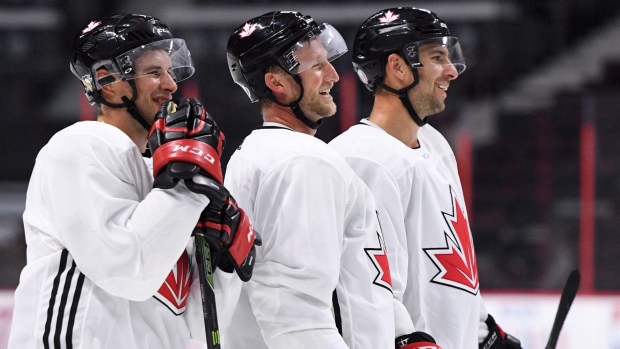Sep 14, 2016
Team Canada embraces win-or-bust mentality
Canada not only won the last battle for international hockey supremacy, but owned it. Regardless, the World Cup of Hockey is indeed Canada's tournament to lose.
The Canadian Press

Canada not only won the last battle for international hockey supremacy, but owned it.
The Canadians rarely had to defend at the 2014 Olympics in Sochi because they hogged the puck so much. They spent what seemed like endless stretches in the offensive zone and surrendered only three goals all tournament, while shutting out Sweden and the United States in the final and semifinal.
"But what won in 2014 isn't going to win this time," Team Canada's head coach Mike Babcock said.
It's partly the residue of that display, however, as well as the deepest roster in the tournament that has the Canadians looking rightfully like heavy favourites for the World Cup of Hockey.
"The expectations for us maybe are a little bit higher, but we don't take anything for granted," Canadian general manager Doug Armstrong said in a recent interview. "To think that we're just going to go there and just put the jerseys on and win because we throw the jerseys on, our guys are much more mature and smarter than that."
Regardless, this is indeed Canada's tournament to lose.
The core of the 2014 squad is back, including at centre-ice with Sidney Crosby, Jonathan Toews and Ryan Getzlaf once again forming the spine of a strong centre-ice contingent. That trio, with either Claude Giroux or Ryan O'Reilly likely to serve as the fourth centre, is complemented by a versatile group of forwards who can score, create, check, hog and/or pursue the puck with vigour.
The Canadians' talent up front is unparalleled. Babcock can match any one of his lines against the best of an opponent and expect an advantage, if not a draw.
The head coach has altered plans on defence with Duncan Keith, Canada's most flexible defender in Sochi, pulling out with injury. If not able to replace the two-time Norris Trophy winner, the Canadians are at least positioned to adequately siphon off his duties. Marc-Edouard Vlasic may be nothing like Keith, but he's a reliable commodity alongside Shea Weber. Any power-play duties Keith might have occupied, meanwhile, can be divvied up among Weber, Drew Doughty, and the squad's new wild card, Brent Burns.
Alex Pietrangelo also seems poised to assume a bigger role.
Depth might just be Canada's best weapon at these tournaments. Injuries, even to superstar talents, merely ding the Canadians.
Tyler Seguin became the latest to withdraw from the World Cup with injury, joining Jamie Benn, Jeff Carter and Keith. His void was promptly filled by O'Reilly, a different type of player who nonetheless adds size and know-how at both ends of the ice. Other injury replacements have included Logan Couture, the NHL's top playoff scorer last spring, and Corey Perry, a six-time 30-goal-scorer. Jay Bouwmeester, a veteran of the Sochi squad who replaced Keith, might play alongside Doughty.
Canada's major advantage here, as Armstrong noted, isn't so much in the quality of its best players, but in the quality of those deeper in the lineup. A prospective fourth line, for example, could feature Joe Thornton, the NHL's fourth-leading scorer last season, and Matt Duchene, who popped 30 goals for the Colorado Avalanche.
Canada added 10 players to the World Cup roster who weren't in Sochi, including Burns and Steven Stamkos, both of whom inject a game-breaking element, especially on the power play.
Much like Doughty, who tied for the team lead in scoring at the Olympics, Burns is capable of creating something from nothing on defence.
If wanting to let Canada's skill shine again, Babcock said it's probably unrealistic to expect a repeat performance of the 2014 Olympic display.
The game has become even faster, he said, leaving next to no room on the ice to manoeuvre, a reality that should be especially evident on the smaller NHL-sized rink in Toronto. Canada has the talent to exploit any openings though with a roster that blends together size, speed, skill and smarts, or all the key components of any hockey club.
The Canadians are smooth enough to tangle with Sweden, Finland or Team North America and strong enough to trade blows with the pugnacious Americans.
"We tried to put a group of players together that could play any style," Armstrong said. "I think what Mike has, and what we hope we provided, is a good depth team that's going to allow him to play any style at any time."
Goaltending remains only a slight question because of Carey Price's long layoff following a season-ending knee injury last season. Before that the 29-year-old was the best goalie in the world and close to unbeatable in Sochi. A return to earlier form only strengthens his country's chances at victory.
"I'm just going to come back and just try and do all the things that made me successful two years ago," he said during training camp.
Braden Holtby, last season's Vezina Trophy winner, and Corey Crawford, a two-time Stanley Cup winner, are otherwise available, another show of Canada's incredible depth.
Babcock didn't think the World Cup could replace the Olympics, either in terms of meaning or experience. But he nonetheless expected his team to be engaged with international supremacy on the line once more.
"When you have a chance to win and I don't care what it's at or what day it is, you want to win," he said.

